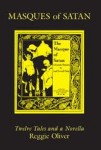 The very lovely and award-winning REGGIE OLIVER has been a professional playwright, actor, and theatre director since 1975. Besides plays, his publications include the authorised biography of Stella Gibbons, Out of the Woodshed, published by Bloomsbury in 1998, four collections of strange stories, and a novel, The Dracula Papers I – The Scholar’s Tale, the first of a projected tetralogy. An omnibus edition of his stories entitled Dramas from the Depths is published by Centipede, as part of its Masters of the Weird Tale series. A fifth collection of his tales, Mrs Midnight, is out from Tartarus in September 2011. In 2010/2011 his farce Once Bitten was a Christmas season sell-out hit at the Orange Tree Theatre, Richmond. His stories have appeared in over thirty anthologies.
The very lovely and award-winning REGGIE OLIVER has been a professional playwright, actor, and theatre director since 1975. Besides plays, his publications include the authorised biography of Stella Gibbons, Out of the Woodshed, published by Bloomsbury in 1998, four collections of strange stories, and a novel, The Dracula Papers I – The Scholar’s Tale, the first of a projected tetralogy. An omnibus edition of his stories entitled Dramas from the Depths is published by Centipede, as part of its Masters of the Weird Tale series. A fifth collection of his tales, Mrs Midnight, is out from Tartarus in September 2011. In 2010/2011 his farce Once Bitten was a Christmas season sell-out hit at the Orange Tree Theatre, Richmond. His stories have appeared in over thirty anthologies.
His story in A Book of Horrors is the elegant “A Child’s Problem”. He is a staunch proponent of the ‘doughnut’ but prefers danishes.
1. What is the secret of a good ghost story?
Atmosphere, first and last. There are other ingredients to be sure, but atmosphere is the essential one. By atmosphere, I don’t simply mean a sense of place; it can just as well be an environment created by a person – as in Walter de La Mare’s “Seaton’s Aunt” or “Mr Kempe” – or a group of people – as in Robert Aickman’s “The Hospice”. Often a ghost story can consist in virtually nothing but atmosphere as in Algernon Blackwood’s classic “The Willows.” The story is negligible: two men camp on an island in the middle of the Danube; they have a disturbed night; they leave the next morning. That’s it. But it leaves an indelible impression of sinister menace. Every good ghost story must have its own particular climate of unease. Those which rely on the familiar gothic furniture – tombs, ruined abbeys, shadowy figures, creaking doors, echoing vaults and the like – don’t work for me. One must be taken by surprise. (Incidentally, none of the stories I have mentioned above are conventional “ghost stories”, but they all have that essential unsettling quality.)
2. What are your writing fetishes, i.e. what can’t you write without?
I can and do write with almost anything and almost anywhere: trains, planes, hospital waiting rooms. All these I find rather stimulating, but when I am in my study I love the fact that I am surrounded by bookshelves. Often, in a pause from work, I will reach out to grab a book at random and read a paragraph or two, almost always from a book I know well. As I write now, I can see Max Beerbohm’s Around Theatres, Edith Sitwell’s letters, Anthony Powell’s diaries, the memoirs of the Duc de St Simon, all old favourites and ready to disgorge something choice. It is surprising how this random reading often supplies quite direct inspiration to the work I am engaged in.
3. The five essential characteristics a writer needs are …
Firstly: a Voice (or style), ie a means of expression that is uniquely your own. Of course there are lots of writers of formulaic thrillers and romances – quite successful ones – who don’t have one, but I don’t want to read them. They bore me. The ones that survive always have this unique voice.
Second: Integrity. The instinctive knowledge of how and what you should write regardless of the pressures of others, and the courage to stick to that.
Third: Clarity. “Clarity is the courtesy of the writer towards the reader,” a very wise old writer once said to me. One has to have the ability to look at a sentence and see if it will make sense to the ordinary reader and whether it contains anything redundant which can be excised.
Fourth: Empathy. The ability to feel as another person, however unsympathetic or alien that person might be – in fact especially when they are unsympathetic and/or alien.
Fifth: Structure. The understanding that every piece of writing, long or short, has an ideal shape, and the ability to write with that essential architecture always at the back of your mind and helping you to form your writing as you go along.
4. I hate being a writer when…
People tell you some anecdote which they think “would make an amazing book.” No, it wouldn’t. It is almost invariably excruciatingly boring and inconsequential. Or people say in that odious, playful tone of voice: “ah, we must be careful, or you’ll put us all into your next book!” No, I wouldn’t. My books are full of interesting people, thank you very much – is what I want to say, but don’t.
5. Donuts or danishes?
Danish – and, incidentally the proper ENGLISH spelling is doughnut.




